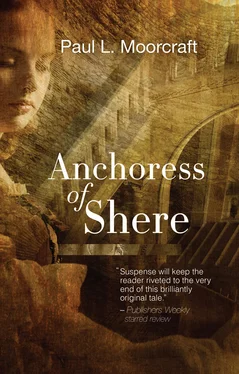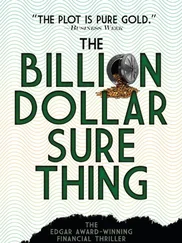Paul Moorcraft - The Anchoress of Shere
Здесь есть возможность читать онлайн «Paul Moorcraft - The Anchoress of Shere» весь текст электронной книги совершенно бесплатно (целиком полную версию без сокращений). В некоторых случаях можно слушать аудио, скачать через торрент в формате fb2 и присутствует краткое содержание. Жанр: Триллер, на английском языке. Описание произведения, (предисловие) а так же отзывы посетителей доступны на портале библиотеки ЛибКат.
- Название:The Anchoress of Shere
- Автор:
- Жанр:
- Год:неизвестен
- ISBN:нет данных
- Рейтинг книги:4 / 5. Голосов: 1
-
Избранное:Добавить в избранное
- Отзывы:
-
Ваша оценка:
- 80
- 1
- 2
- 3
- 4
- 5
The Anchoress of Shere: краткое содержание, описание и аннотация
Предлагаем к чтению аннотацию, описание, краткое содержание или предисловие (зависит от того, что написал сам автор книги «The Anchoress of Shere»). Если вы не нашли необходимую информацию о книге — напишите в комментариях, мы постараемся отыскать её.
The Anchoress of Shere — читать онлайн бесплатно полную книгу (весь текст) целиком
Ниже представлен текст книги, разбитый по страницам. Система сохранения места последней прочитанной страницы, позволяет с удобством читать онлайн бесплатно книгу «The Anchoress of Shere», без необходимости каждый раз заново искать на чём Вы остановились. Поставьте закладку, и сможете в любой момент перейти на страницу, на которой закончили чтение.
Интервал:
Закладка:
“There is no problem with a stumble. It is knowing and understanding. That is what counts. This is not an elocution lesson.”
“Michael, may I interrupt? You have a wonderful voice. Did you learn to speak that way or was it something God-given?” Marda would never have used that adjective before. She did it unconsciously. With a start, she realised her vocabulary was altering.
“I was born with it.”
“Where?”
He seemed reluctant to concede further information, then suddenly blurted out, “Not far from here…” And then again, he said, “Not far from here. Not far from here…”
A curtain descended and blanked out his motor functions and his speech; his eyes were glazed. Marda remained absolutely still, while Duval, triggered by some past trauma, explored his inner being.
Although he tended to live in the past, both professionally and personally, Duval did not talk about his own history. To anyone. He didn’t even like thinking about his upbringing. At first he had tried to forget the whole business, then he attempted to change reality: Duval rejected, then falsified, most of the emotional experiences of his childhood. And he had eventually come to believe these lies as fact.
Especially, Duval tried not to think about his father, who was cold and authoritarian towards him when he was young. He had been attached to his mother, and had some fond memories of his childhood before the tragedy of his sister’s mental illness and eventual suicide. After that he grew away from his mother. His conversion to Catholicism caused the final break in an already emotionally estranged family. The Church became his mother, yet although he loved Catholicism, he also hated parts of it.
Duval recovered almost immediately from his brief reverie, but even if it had lasted for eternity, he would never have fully recognised the element of destructiveness in his complex Oedipal relationship with his Church, which to him was both a protective and persecuting goddess.
Duval seemed not to notice that both he and Marda had been silent for over a minute. She had learned to remain very still and quiet when occasionally he slipped into these almost catatonic states.
“But enough of me. Let us get on,” he said in a normal voice, as though he were in the middle of an Oxbridge tutorial.
Silence again ensued as he fiddled with his pipe for a few seconds.
“I will ask you a personal question before we carry on. You have an unusual name. What does it mean?”
“Oh, Michael, you don’t want to know…”
“Yes, I do. Please tell me.”
“Well, it’s the name of a mountain pass in Somalia. My father served there during the war and he just liked the sound of it.”
“How very noble of him.” Duval smiled. “Yes, it’s a pretty name, and it sounds like ‘martyr.’ That’s what I thought when I first heard it…‘And the desert shall rejoice, and blossom as the rose.’ Isaiah, chapter thirty-five, verse one.”
He stopped himself and his voice became a fraction sterner: “Now the Apostles’ creed. How does mortal sin kill the soul?”
Marda was disconcerted by his gloss on her name, but she could not allow herself to be side-tracked; she had to be ready: “Mortal sin kills the soul by depriving it of sanctifying grace, which is the supernatural life of the soul.”
Marda did not want to ponder on mortal sins like murder and possibly get lost in a blind alley where she would have to confront him. “And of course a venial sin is an offence,” she said, “which does not kill the soul, yet displeases God and often leads to mortal sin…”
She looked up at him. “You have told me a lot about the soul, Michael.”
She tried to use his name often; it bred a familiarity, a touch of friendship. You don’t kill your friends, Marda thought. Did the others try to be friends, too? Or were they all too “difficult,” as he put it? Was she less brave than the rest or simply wiser? Or nicer? She kept wondering.
“If the soul’s immortal, Michael, how can sin kill it?”
He answered the question, not very satisfactorily thought Marda, but she wouldn’t dare say so. He also tried to explain that the invisible part of the human being, the soul, was not restrained by Einstein’s laws of space and time. But he did respond eagerly and in depth, so Marda assumed that it was a good question. The longer the answer, the better the question was her rule of thumb. She had learned that without going to university.
He asked her to define “hope”; then she was asked to explain “prayer.”
Marda replied quickly. “Prayer is the raising up of the mind and heart to God…is that right?”
Duval sucked on his pipe and nodded.
Marda was sincere in wanting to learn all about prayer. There was no dissimulation here. Duval seemed to know most of the time if she was acting, so she was always trying to play double bluff, and therefore sometimes not even admitting things to herself in his presence.
“Good, good. Now the Ten Commandments.”
Marda rattled them off. She slowed on “Honour thy father and thy mother” but only slightly, and then only marginally speeded up on “Thou shalt not kill.” She was learning as much about diplomacy as theology.
“Are you saying grace before your food?”
“Oh, yes,” she said. She risked direct lies occasionally.
“Another aspect of the Christian’s daily exercise, then. How should you begin your day?”
She scratched her ribs and wondered if she had lice, but no emotion showed in her reply: “I should begin the day by making the sign of the Cross as I wake up in the morning and by saying some kind of short prayer, for example, ‘O my God, I offer my heart and soul to You.’”
Duval seemed pleased. “You are learning quickly. In a few weeks we can get you to confirmation stage, and then on to taking part in Holy Communion. I will also explain penance and absolution.”
“Michael, speaking as someone who knew so little about religion, I am grateful for”-she was going to say “your time,” but she stopped herself-“for your patience, but may I ask what level I am supposed to reach?” She wanted to say something about the fact that, to her knowledge, there had never been a female Pope, but that would certainly have come into his definition of facetiousness.
“I will explain more later. Perhaps first I will show you some of the history I am writing. Not quite yet. It needs some editing, but it is the story of a woman’s purification, and I hope it will make things clearer.”
Marda didn’t push him.
In these “seminars,” as he called them, he soon dispensed with the handcuffs. Initially he locked the door behind him and watched her carefully, but as the weeks passed, and she made no attempt to escape, he grew more relaxed. There had been no “removal of privileges” for at least ten days. He seems to like me, she thought.
Marda’s cell was tolerably warm. She had light for up to twelve hours a day, and an extra towel. Her little library had extended beyond the Bible and Lives of the Saints -she had enjoyed particularly a history of the Crusades and a book of religious poetry. In the dismal dark world she inhabited, Hopkins’s “Glory be to God for dappled things” took on a very special meaning, of hope for light, literally, in the future. She desperately wanted to get out, of course, and above all to reassure her family, but somehow she didn’t think Duval intended to kill her. She tried to find out what he really wanted from her. Was he simply trying to convert her? Secure one good Catholic conversion before he died or…What if something did happen to him? If he were knocked over by the proverbial bus or had a heart attack? No one would find her. She would starve.
Читать дальшеИнтервал:
Закладка:
Похожие книги на «The Anchoress of Shere»
Представляем Вашему вниманию похожие книги на «The Anchoress of Shere» списком для выбора. Мы отобрали схожую по названию и смыслу литературу в надежде предоставить читателям больше вариантов отыскать новые, интересные, ещё непрочитанные произведения.
Обсуждение, отзывы о книге «The Anchoress of Shere» и просто собственные мнения читателей. Оставьте ваши комментарии, напишите, что Вы думаете о произведении, его смысле или главных героях. Укажите что конкретно понравилось, а что нет, и почему Вы так считаете.












